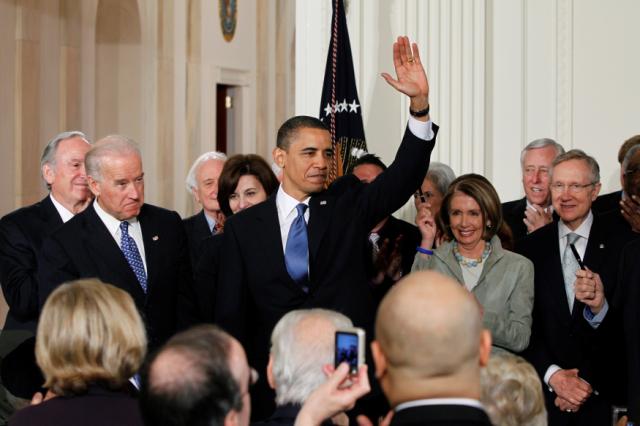Former Arizona Gov. Jan Brewer fought her own Republican party in the state Legislature for months to push through a Medicaid expansion under the Affordable Care Act.
That was three years ago. Now, as an early Donald Trump supporter who has his ear, Brewer hopes one of the pillars of President Barack Obama’s health care law can be saved as Trump pushes to dump much of the overhaul.
“I don’t know how much of that, and I mean it sincerely, is going to be affected,” she told The Associated Press in an interview. She said she’s encouraging Trump’s administration to look at Arizona’s model because it is so cost-effective.
Brewer said the low-income population that the Medicaid expansion was designed to cover was one of the main drivers of the law, and she’s not prepared to see that group go without care. Nearly 400,000 Arizonans have gained Medicaid insurance since Brewer’s proposal took effect in 2014.
Arizona is one of 31 states that expanded Medicaid, many of them run by Democrats. Republicans have blocked expansion in the remaining 19 states.
Among the GOP-led states that expanded Medicaid, many officials are like Brewer, strong proponents of the program that has brought insurance to about 9 million low-income Americans who can’t possibly afford to buy it themselves. Before the expansion, those people had little access to regular health care, and when they got sick, hospitals were forced to treat them without compensation.
States that strongly oppose Medicaid expansion, however, continue to do so.
Mississippi’s three top Republican leaders have said consistently for years that they believe the state cannot afford expansion, as have Idaho’s GOP leaders.
Florida Gov. Rick Scott called for a complete repeal of Obama’s overhaul a week after the Nov. 8 election. Scott has been vague, however, about what should be done about the 20 million Americans who got health insurance through the overhaul, nearly half of them though Medicaid expansion his state rejected.
If he doesn’t completely dump the program, Trump will be under pressure to allow changes to it to give states more control.
Current Arizona Gov. Doug Ducey last year proposed a work requirement for healthy Medicaid recipients, premiums and co-pays and a five-year limit on coverage. The Obama administration approved limited co-pays but nixed the work requirement and the five-year limit. Michigan, Indiana and Iowa also have been allowed to charge premiums or fees, but broader changes requested by some states have been rejected.
Vice president-elect Mike Pence told Republican governors meeting in Florida on Nov. 14 that Trump would replace traditional Medicaid funding to states with block grants that “encourage innovation that better delivers health care to eligible residents,” according to a statement from the Trump transition team.
Pence, Indiana’s governor, expanded Medicaid in his state but got waivers from the Obama administration to implement plans that kick healthy people off the program for six months if they fail to pay premiums.
Arkansas Gov. Asa Hutchinson said he hopes Trump’s election means the state will have more flexibility in how it spends Medicaid money. More than 300,000 people are enrolled in the state’s hybrid Medicaid expansion, which uses federal expansion money to buy private insurance for low-income residents.
“This election means we’re going to have an administration that wants to give more flexibility to the states,” Hutchinson, a Republican, said recently. “So this is good news in our ability to get waivers to implement the reform we want in terms of work requirements, in terms of cost-sharing, in terms of other elements of reform that encourages employer-based insurance.”
Hutchinson stopped short of saying whether he’d like some form of coverage for those on the expanded Medicaid program to continue if Trump and congressional Republicans repeal the Affordable Care Act.
But Ducey, Arizona’s governor, said recently the discussion is “not only about repeal but replace.”
“We want to see all of our citizens have access to affordable health care,” Ducey told reporters in response to a question about the future of Medicaid expansion. “That was the objective. That’s not where we are. We’ve got a new president and a new Congress, and a fresh start.”
A spokesman for Republican Michigan Gov. Rick Snyder said he plans to work with the new administration to tout the successes and advantages of his state’s Medicaid expansion.
“How we continue that success is important, and he’s willing to discuss how to do that with anyone who has other ideas to consider,” Ari Adler said.
As for Arizona’s former governor, she said her state’s Medicaid program is among the nation’s best in terms of costs and provider choice. The program contracts with private insurers to provide care on a per-patient basis.
“I don’t know how you could deliver that population any more services better, more cheaply, than what we’ve already done here,” Brewer said.














